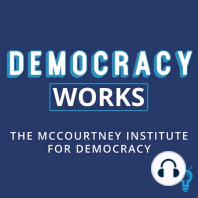33 min listen
The ongoing struggle for civil rights
FromDemocracy Works
ratings:
Length:
37 minutes
Released:
Apr 8, 2019
Format:
Podcast episode
Description
Joyce Ladner was at the forefront of the Civil Rights Movement in Mississippi in the 1950s and 60s as a member of the Student Nonviolent Coordinating Committee (SNCC). She was mentored by Medgar Evers, expelled from Jackson State University for participating in a sit-in, and failed Mississippi’s voter literacy test three times. She discusses those experiences with us, along with the disconnect between learning the principles of civics education knowing that some of them didn’t apply to her.Joyce also describes how Emmett Till moved her generation to action, and how Trevon Martin is doing the same for a new generation of organizers. She visited Penn State to deliver the annual Barbara Jordan lecture, hosted by the Africana Research Center.Additional InformationPenn State Africana Research CenterInterview Highlights[4:44] What was the catalyst for you to get involved in the Civil Rights Movement?The catalyst for us was the lynching of 14-year-old Emmitt Till in Mississippi[5:15] How did that make you feel and how you did you translate those feelings into your actions?I remember feeling very very powerless back then. Sort of visceral reaction came when I saw the photograph of Emmett Till on the cover of Jet Magazine. That photograph made me feel that I had to one day do something.[9:42] Did you see any changes or any integration efforts following Brown v. Board of EducationNo, what happened to the Deep South was that the Southern states immediately after the Brown decision came down rushed to build new schools for black children, so we got a new school.[14:42] What do you think is missing from how civics education and democracy are being taught today?I took high school history and social science civics to become good citizens. We were informed with a knowledge base in ethics and values, and about what democracy was. I think that one of the worst things that’s happened in subsequent years is the decline of civics education. A lot of social science type courses have suffered tremendously.[16:55] What do you think about Black Lives Matter Movement?Black Lives Matter is to this generation what’s SNCC was to my generation, and also Trayvon Martin is to this generation what Emmett Till was to mine. Here you have a case of a young man who was just shot and murdered and the response to it is a national outpouring of anger and eventually that anger was channeled by young people (college students and non-college students). I should say is the case in a manner that was very similar. I was so excited to see that finally we have some movement activity.[20:16] What was the process to become a registered voter?I tried to register to vote three times in Harrisburg, but I failed the voter register literacy test because all black people who went to register were failed. At the same time all white people were registered. I was required to write essays on two questions, one was an interpretation of section in the U.S. Constitution. They never gave us reasons. They just says “you failed to pass this test, you didn’t answer these questions adequately”.[24:41] Was there something that united all the different organizing that you did, whether for civil rights, voting rights or all of those?Freedom was the reason to do all of this. Equality was later added but freedom remain the constant.[26:57] What advice did you have to say to young people or anyone who wants to get involved in organizing and trying to impact what they perceive as injustice?Freedom is not free. Each generation has to fight for those same rights all over again because they’re not permanent.
Released:
Apr 8, 2019
Format:
Podcast episode
Titles in the series (100)
Checking the President’s power: From Watergate to Benghazi to Robert Mueller, U.S. history is full of congressional hearings. You’ve no doubt heard about them in the news, but do you know what those House and Senate committees actually do and what their role is in a democracy? We address those questions and more with Doug Kriner, professor of Government … Continue reading Checking the President’s power → by Democracy Works
